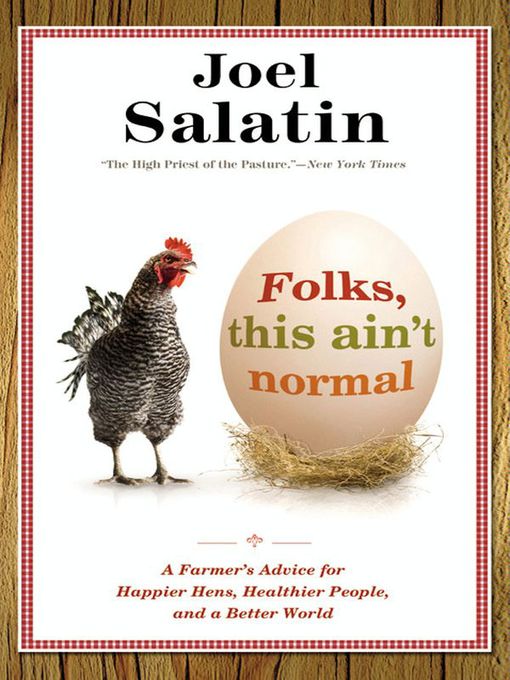
Folks, This Ain't Normal
A Farmer's Advice for Happier Hens, Healthier People, and a Better World
کتاب های مرتبط
- اطلاعات
- نقد و بررسی
- دیدگاه کاربران
نقد و بررسی

November 14, 2011
Salatin, an experienced farmer notable for cameos in Michael Pollan's The Omnivore's Dilemma and the documentary, Food Inc., contributes a convincing group of essays about the way we fail ourselves and the environment through industrial monoculture farming. Dedicated to producing real food for a local market, much of his written work (he has self-published seven books, including Everything I Want to Do Is Illegal) is concerned with nonsensical government regulations and this book is no exception. Topics range from child-rearing to the importance of herbivores in farming and food cycles; readers will learn more about excrement than they ever cared to know. Perhaps the biggest question threading the collection is one Salatin asks himself: Is this way of living "normalâ or anachronistic? Most readers will reach mixed conclusions, but likely feel compelled to make a few lifestyle changes following what he preachesâhis handy bullet points for action at each chapter's end make it easy to try. Liberals and conservatives alike will find things to love and hate from this self-described "Christian libertarian environmentalist capitalist lunatic,â but that makes this book all the more fun and challenging.Â

October 15, 2011
Virginia farmer Salatin laments that Americans have lost their "historically normal" agrarian knowledge and, consequently, the ability to make intelligent decisions about their food. Salatin gained prominence in foodie circles after being profiled in Michael Pollan's The Omnivore's Dilemma and the documentary Food, Inc. He contends that a return to the basics in food production and preparation--including locally sourced food, home gardens, and home cooking--would result in a stronger economy, healthier citizens, and environmental protection. He offers suggestions for adopting a "normal" approach to food and farming, often challenging mainstream environmental principles. Many of Salatin's arguments are thought-provoking, but his tendency to value-judge and mock those with whom he disagrees undermines his credibility. An extensive antigovernment diatribe seems particularly out of place. VERDICT Some readers may be surprised by Salatin's sarcasm and antigovernment tirades, but his book offers valid suggestions for those seeking an alternative to industrial food sources. Because of its lack of supporting data and footnotes, this is not recommended as an academic work.--Kelsy Peterson, Prairie Village, KS
Copyright 2011 Library Journal, LLC Used with permission.

October 1, 2011
Salatin continues his defense of sustainable ecological practices on the farm and in the family. Expanding on lessons learned husbanding his thriving Virginia farm, he proposes that much tension surrounding the exploitation of the earth and the management of farm animals can be resolved with fuller education of urbanites, whose remove from their food's sources has spread abroad much disruptive disinformation. In genial, chatty text, Salatin relates stories of well-meaning, but ignorant, charges of animal cruelty on his farm by people who anthropomorphize animals and find suffering and abuse in animal behaviors that are natural and even healthy. Salatin also makes a case that much urban youthful misbehavior, drug use, and gang violence might be avoided if the perpetrators instead had a regimen of farm chores to structure their time and to offer constructive outlet for their energies. An engaging read with plenty for city folk to learn about farming realities.(Reprinted with permission of Booklist, copyright 2011, American Library Association.)

























دیدگاه کاربران